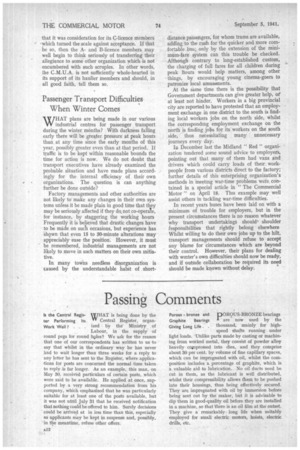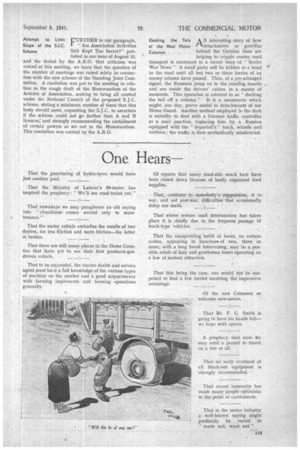Passing Comments
Page 14

Page 15

If you've noticed an error in this article please click here to report it so we can fix it.
WHAT is being done by the Central Register, organized by the Ministry of Labour, in the supply of round pegs for round hi?les? We ask for the reason that one of our correspondents has written to us to say that whilst in the ordinary way he has never had to wait longer than three weeks for a reply to any letter he has sent to the Register, where applica-tions for posts are concerned the normal time taken to reply is far longer. As an example, this man, on May 30, received particulars of certain posts, which were said to be available. He applied at once, supported by a very strong recommendation from his company, which emphasized that he was particularly suitable for at least one of the posts available, but it was not until July 31 that he received notification that nothing could be offered to him. Surely decisions could be arrived at in'less time than this, especially as applicants may be kept in suspense and, possibly, in the meantime, refuse other offers. Is the Central Register Performing Its Work Well Porous bronze and pOROUS-BRONZE bearings Graphite Bearings A are now used by the Giving Long Life . . thousand, mainly for high
speed shafts running under light loads. .Unlike parts made by casting or machining from worked metal, they consist of powder alloy heavily coinpressed into dies, and they comprise about 30 per cent, by volume of fine capillary spaces, which can be impregnated with oil, whilst the composition includes a percentage of graphite, which is a valuable aid to lubrication. No oil ducts need be cut in them, as the lubricant is well distributed, whilst their compressibility allows them to be pushed into their housings, thus being effectively secured. They are impregnated with oil by immersion before being sent out by the maker, but it is advisable to dip them in good-quality oil before they are installed in a machine, so that there is an oil film at the outset. They give a remarkably long life when suitably employed for small electric motors, hoists, electric drills, etc.
Attempt to Limit rURTHER to our paragraph, Scope of the S.J.C "Are Association Activities
Scheme Still Kept Too Secret?" pub
lished in our issue of August 15, and the denial by the A.R.O. that criticism was voiced at this meeting, we learn that the question of the number of meetings was raised solely in connection.with the new scheme Of the Standing Joint Committee, A resolution was put to the meeting in relation to the rough draft of the Memorandum of the Articles of Association, seeking to bring all control under the National Council of the proposed S.J.C. scheme, stating a minimum number of times that this body should meet, requesting the S.J.C. to ascertain if the scheme could not go farther than A and B licences: and strongly recommending the curtailment
• of certain powers as set out in the Memorandum. This resolution was carried by the A.R.O.
Docking the Tails A N interesting story of hew of the Nazi Motor r-Ldetachments or. guerillas
Columns behind the German lines are helping to cripple enemy road transport is contained in a recent issue of " Soviet War News." A small party will lie hidden at a bend in the road math all but two or three lorries of an enemy column have passed. Then, at a pre-arranged signal, the Russians jump on to the running boards t and are inside the drivers' cabins in a matter of moments. This operation is referred to as "docking the tail off a column." It a manceuvre which might, one day, prove useful to detachments of our Home Guard. Another method employed in the dark is suitably to deal with a German traffic controller at a road junction, replacing him by a Russian equipped with the " departed's " torch, whistle and uniform ; the traffic is then methodically misdirected.




















































